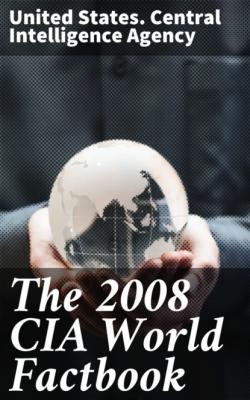The 2008 CIA World Factbook. United States. Central Intelligence Agency
Чтение книги онлайн.
Читать онлайн книгу The 2008 CIA World Factbook - United States. Central Intelligence Agency страница 391
 style="font-size:15px;"> Guinea
style="font-size:15px;"> Guinea
Country name:
conventional long form: Republic of Guinea conventional short form: Guinea local long form: Republique de Guinee local short form: Guinee former: French Guinea
Government type:
republic
Capital:
name: Conakry geographic coordinates: 9 33 N, 13 42 W time difference: UTC 0 (5 hours ahead of Washington, DC during Standard Time)
Administrative divisions:
33 prefectures and 1 special zone (zone special)*; Beyla, Boffa,
Boke, Conakry*, Coyah, Dabola, Dalaba, Dinguiraye, Dubreka, Faranah,
Forecariah, Fria, Gaoual, Gueckedou, Kankan, Kerouane, Kindia,
Kissidougou, Koubia, Koundara, Kouroussa, Labe, Lelouma, Lola,
Macenta, Mali, Mamou, Mandiana, Nzerekore, Pita, Siguiri, Telimele,
Tougue, Yomou
Independence:
2 October 1958 (from France)
National holiday:
Independence Day, 2 October (1958)
Constitution:
23 December 1990 (Loi Fundamentale)
Legal system:
based on French civil law system, customary law, and decree; accepts compulsory ICJ jurisdiction with reservations
Suffrage:
18 years of age; universal
Executive branch:
chief of state: President Lansana CONTE (head of military government since 5 April 1984, elected president 19 December 1993) head of government: Prime Minister Ahmed Tidiane SOUARE (since 23 May 2008) cabinet: Council of Ministers appointed by the president elections: president elected by popular vote for a seven-year term (no term limits); candidate must receive a majority of the votes cast to be elected president; election last held 21 December 2003 (next to be held in December 2010); the prime minister is appointed by the president election results: Lansana CONTE reelected president; percent of vote - Lansana CONTE 95.3%, Mamadou Bhoye BARRY 4.6%
Legislative branch:
unicameral People's National Assembly or Assemblee Nationale Populaire (114 seats; members are elected by a mixed system of direct popular vote and proportional party lists) elections: last held 30 June 2002 (next to be held in 2008) election results: percent of vote by party - PUP 61.6%, UPR 26.6%, other 11.8%; seats by party - PUP 85, UPR 20, other 9 note: legislative elections were due in 2007 but have been postponed
Judicial branch:
Court of First Instance or Tribunal de Premiere Instance; Court of
Appeal or Cour d'Appel; Supreme Court or Cour Supreme
Political parties and leaders:
National Union for Progress or UPN [Mamadou Bhoye BARRY]; Party for Unity and Progress or PUP (the governing party) [Lansana CONTE]; People's Party of Guinea or PPG [Charles Pascal TOLNO]; Rally for the Guinean People or RPG [Alpha CONDE]; Union of Democratic Forces of Guinea or UFDG [Cellou Dalein DIALLO]; Union of Republican Forces or UFR [Sidya TOURE]; Union for Progress of Guinea or UPG [Jean-Marie DORE, secretary-general]; Union for Progress and Renewal or UPR [Ousmane BAH]
Political pressure groups and leaders:
National Confederation of Guinean Workers-Labor Union of Guinean
Workers or CNTG-USTG Alliance (includes National Confederation of
Guinean Workers or CNTG [Rabiatou Sarah DIALLO] and Labor Union of
Guinean Workers or USTG [Dr. Ibrahima FOFANA]); National Council of
Civil Society Organizations of Guinea or CNOSCG [Ben Sekou SYLLA];
Syndicate of Guinean Teachers and Researchers or SLECG [Dr. Louis
M'Bemba SOUMAH]
International organization participation:
ACP, AfDB, AU, ECOWAS, FAO, G-77, IBRD, ICAO, ICCt, ICRM, IDA, IDB,
IFAD, IFC, IFRCS, ILO, IMF, IMO, Interpol, IOC, IOM, IPU, ISO
(correspondent), ITSO, ITU, ITUC, MIGA, MINURSO, NAM, OIC, OIF,
OPCW, UN, UNCTAD, UNESCO, UNHCR, UNIDO, UNMIS, UNOCI, UNWTO, UPU,
WCL, WCO, WFTU, WHO, WIPO, WMO, WTO
Diplomatic representation in the US:
chief of mission: Ambassador Mory Karamoko KABA chancery: 2112 Leroy Place NW, Washington, DC 20008 telephone: [1] (202) 483–9420 FAX: [1] (202) 483–8688
Diplomatic representation from the US:
chief of mission: Ambassador (vacant); Charge d'Affaires Elizabeth RASPOLIC embassy: Koloma, Conakry, east of Hamdallaye Circle mailing address: B. P. 603, Transversale No. 2, Centre Administratif de Koloma, Commune de Ratoma, Conakry telephone: [224] 65–10-40–00 FAX: [224] 65–10-42–97
Flag description:
three equal vertical bands of red (hoist side), yellow, and green; uses the popular pan-African colors of Ethiopia
Economy
Guinea
Economy - overview:
Guinea possesses major mineral, hydropower, and agricultural resources, yet remains an underdeveloped nation. The country has almost half of the world's bauxite reserves and is the second-largest bauxite producer. The mining sector accounts for over 70% of exports. Long-run improvements in government fiscal arrangements, literacy, and the legal framework are needed if the country is to move out of poverty. Investor confidence has been sapped by rampant corruption, a lack of electricity and other infrastructure, a lack of skilled workers, and the political uncertainty due to the failing health of President Lansana CONTE. Guinea is trying to reengage with the IMF and World Bank, which cut off most assistance in 2003, and is working closely with technical advisors from the U.S. Treasury Department, the World Bank and IMF, seeking to return to a fully funded program. Growth rose slightly in 2006–07, primarily due to increases in global demand and commodity prices on world markets, but the standard of living fell. The Guinea franc depreciated sharply as the prices for basic necessities like food and fuel rose beyond the reach of most Guineans. Dissatisfaction with economic conditions prompted nationwide strikes in February and June 2006.
GDP (purchasing power parity):
$10.96 billion (2007 est.)
GDP (official exchange rate):
$4.714